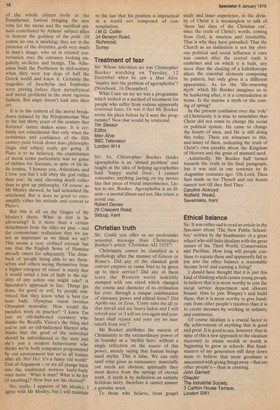Christian truth
Sir: Could you offer us no profounder seasonal message than Christopher Booker's article 'Christmas AD 1978'?
Christianity cannot be classified as a mythology after the manner of Greece or Rome's. Did any of the classical gods convert empires or cause lives to be given up to their service? Did any of them leave the Western world indelibly stamped with one creed which changed the course and character of its civilisation for ever, through a unique combination of visionary power and ethical force? Did Apollo say, or Zeus, 'Come unto me all ye that travail and are heavy laden and I will refresh you' or 'I will see you again and your heart shall rejoice and your joy no man taketh from you'?
Mr Booker attributes the success of Christianity to the extraordinary power of its founder as a 'mythic hero' without a single reflection on the source of this power, merely saying that human beings need myths. This is false. We can only need what gives us sustenance: materially our needs are obvious, spiritually they must derive from the springs of eternal truth. A myth is by definition an entirely fictitious story, therefore it cannot answer a genuine need.
To those who believe, from gospel study and inner experience, in the divinity of Christ it is meaningless to talk of 'these last days of the Christian era', since the truth of Christ's words, coming from God, is timeless and irresistible. That is why they have prevailed. That the Church as an institution is not the obvious political and social influence it once was cannot alter the central truth it enshrines and on which it is built, any more than the shaking of a kaleidoscope alters the essential elements composing its pattern, but only gives it a different appearance. As for the life-renewing myth' which Mr Booker imagines us to be hankering after, it is a contradiction in terms. Is the sunrise a myth or the coming of spring?
In the present confusion over the 'role' of Christianity it is wise to remember that Christ did not come to change the social or political system. He came to change the hearts of men, and He is still doing this today. There are witnesses to this, and many of them, indicating the truth of Christ's own parable about the Kingdom of Heaven and the grain of mustard seed.
Admittedly, Mr Booker half turned towards the truth in his final paragraph, but it was said in one sentence by St Augustine centuries ago: 'Oh Lord, Thou hast made us for Thyself and our hearts cannot rest till they find Thee.'
Caroline Ackroyd Nutfield, Weald, Sevenoaks, Kent






























 Previous page
Previous page